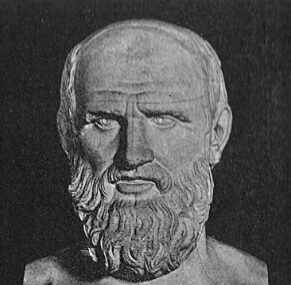
Hippocrates, widely regarded as the father of modern medicine, was a Greek physician born on the island of Kos in 460 BCE. He came from a family of physicians and was trained by his father and grandfather, both of whom were respected healers in their time. Hippocrates continued their legacy by becoming one of the most influential and innovative physicians in history.
Hippocrates is famous for his contributions to medical knowledge and the development of the Hippocratic Oath, which sets ethical standards for medical practice. His ideas were grounded in observation, experimentation, and logic, rather than superstition or divine intervention. He believed that the human body had the ability to heal itself, and that the role of the physician was to support and facilitate this natural process.
Hippocrates was a prolific writer and many of his works have survived to the present day. His most famous book, the Hippocratic Corpus, is a collection of medical texts that cover topics ranging from anatomy and physiology to diagnosis and treatment of diseases. These writings were instrumental in establishing the foundation of modern medical practice and influenced generations of physicians for centuries to come.
One of Hippocrates’ greatest successes was his approach to diagnosis and treatment. He believed in the importance of observing the patient’s symptoms and taking a detailed medical history before making a diagnosis. He also emphasized the use of natural remedies and non-invasive treatments whenever possible, rather than relying on surgery or drugs.
Hippocrates’ approach to medicine was widely adopted throughout the ancient world, and his ideas continue to influence medical practice to this day. His legacy is celebrated with the Hippocratic Oath, which is still taken by medical professionals as a promise to uphold ethical standards in their practice.
Hippocrates died in 370 BCE at the age of 90, but his impact on the field of medicine continues to be felt today. He is remembered as a brilliant physician, a champion of rational thinking, and a pioneer of evidence-based medicine. His contributions to medical knowledge have saved countless lives and improved the health and well-being of people around the world.
Timeline:
- 460 BCE: Hippocrates is born on the Greek island of Kos, to a family of physicians.
- 430 BCE: Hippocrates studies medicine under his father and grandfather.
- 410 BCE: Hippocrates begins practicing medicine, traveling throughout Greece and treating patients.
- 400 BCE: Hippocrates founds the famous medical school on the island of Kos, which becomes renowned for its innovative approach to medicine.
- 390 BCE: Hippocrates writes his most famous work, the Hippocratic Corpus, a collection of medical texts that covers topics ranging from anatomy and physiology to diagnosis and treatment of diseases.
- 370 BCE: Hippocrates dies at the age of 90, but his ideas and teachings continue to influence medicine for centuries to come.
- 300 BCE: The teachings of Hippocrates are compiled into the Hippocratic Oath, a code of ethics for physicians that sets standards for ethical medical practice.
- 200 BCE: The works of Hippocrates are translated into Latin, making them accessible to a wider audience in the Roman Empire.
- 1300 CE: The works of Hippocrates are rediscovered during the Renaissance and become influential in the development of modern medicine.
- 1800 CE: The use of the Hippocratic Oath becomes widespread in medical schools and is still used today as a pledge to uphold ethical standards in the practice of medicine.
- 1900 CE: The principles of Hippocrates continue to inspire medical research and innovation, as new discoveries and treatments build on the foundation he laid down over two thousand years ago.
5 interesting facts about Hippocrates:
- Hippocrates is widely considered the father of modern medicine and is credited with separating medicine from philosophy and superstition.
- Hippocrates was one of the first physicians to document patient symptoms and medical history, which laid the foundation for modern medical diagnosis.
- Hippocrates believed that medicine should be based on observation, logic, and experimentation, rather than on divine intervention or supernatural causes.
- Hippocrates was also interested in public health and sanitation, and recommended measures such as cleaning up city streets and purifying drinking water to prevent disease.
- The Hippocratic Oath, which is still taken by medical professionals today, is named after Hippocrates, but he likely did not write it himself.
5 quotes from Hippocrates:
- “Cure sometimes, treat often, comfort always.”
- “As to diseases, make a habit of two things — to help, or at least to do no harm.”
- “Walking is man’s best medicine.”
- “Natural forces within us are the true healers of disease.”
- “Wherever the art of medicine is loved, there is also a love of humanity.”
click here, to see the most famous 20 doctors










